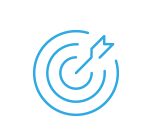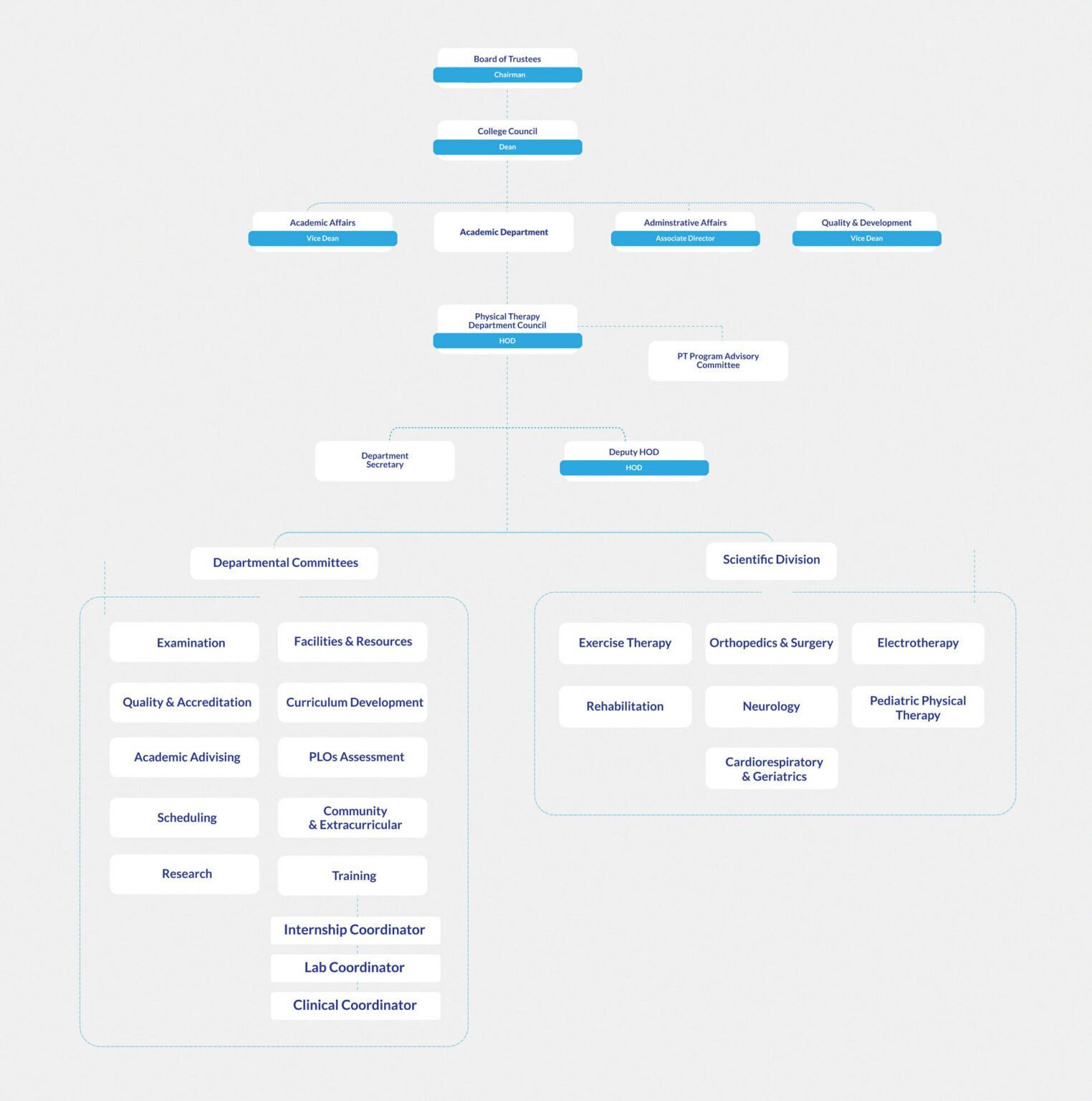Bachelor of Physical Therapy

Vision
Leadership in education and training in the Physical Therapy profession and excellence in scientific research, innovation and community services.

Mission
To graduate competent Physical Therapy specialists primed to community service, research, and life-long learning through distinctive education and training.
Program
The Physical Therapy program aims to improve patient’s quality of life through evidence-based healthcare. This program involves a range of therapeutic modalities such as therapeutic exercise, electrotherapy, joint mobilization, and massage to treat physical problems caused by illness, accidents, or ageing.

Credit hours: 131 hours.
Years of study :
5 years (1 Year Foundation Year + 3 years Physical Therapy program + 1 year internship).
2+X Global Health Program
Program Goals
- Provide quality education and training.
- Promote research and innovation.
- Promote community responsibility.
- Recruit and maintain qualified and competent staff and students.
- Foster lifelong learning.
- Maintain financial stability and sustainability.
- Maintain the program’s infrastructure.
- Broaden institutional collaborations.
Clinical Experiences
The Bachelor of physical therapy (PHTH) program at the Mohammed Al-Mana College for Medical Sciences offers students practical training in different clinical settings, such as hospitals, clinics, community health agencies, homes for the elderly and GYM.
Assessment
A variety of assessment techniques are used in order to assess the knowledge and skill gained during and at the end of each course.
Formative assessment – includes quizzes, midterm, assignments, projects, clinical skills evaluation, clinical assignments and many other methods to evaluate the ongoing knowledge and skills of the students throughout the semester.
Summative assessment – comprehensive written final exam for theory and an Objectively Structured Clinical Evaluation (OSCE) for the clinical
Internship Year
The internship program for physical therapy at the Mohammad Al-Mana College for Medical Sciences spans 52 weeks and allows interns to hone their practical skills, apply their knowledge, and demonstrate competency.
Study Plan
Level 1
| Course Code | Course Title | Required or Elective | Pre-Requisite Courses | Credit Hours |
|---|---|---|---|---|
| ENGL-100-1 | English Language | Required | Admission | 6 |
| ISLC-100 | Islamic Culture | Required | Admission | 2 |
| PHYS-100 | General Physics | Required | Admission | 3 |
| LRSK-100 | Learning & Searching Skills | Required | Admission | 2 |
| COMP-100 | Computer Skills and Information Technology | Admission | 2 | |
| PHED-101 | Health & Physical Education | Admission | 1 |
Level 2
| Course Code | Course Title | Required or Elective | Pre-Requisite Courses | Credit Hours |
|---|---|---|---|---|
| ENGL-100-2 | English Language | Required | ENGL100-1 | 5 |
| ISLC-200 | Islam and Construction of the Society | Required | ISLC-100 | 2 |
| BIOL-100 | Biology | Required | Admission | 4 |
| CHEM-100 | General Chemistry | Required | Admission | 4 |
| ETHS-100 | Introduction To Ethical Dimensions for Health Care Professionals | Required | Admission | 1 |
| COMM-100 | Communication skills | Required | Admission | 2 |
Level 3
| Course Code | Course Title | Required or Elective | Pre-Requisite Courses | Credit Hours |
|---|---|---|---|---|
| MDTR 210 | Medical terminology | Required | ENGL-100-2 | 2 |
| HUAP 210 | Human Anatomy & physiology I | Required | BIOL-100 | 4 |
| BIOC-210 | Biochemistry | Required | CHEM-100, BIOL-100 | 3 |
| ENGL-200 | English for Specific Purposes | Required | ENGL 100-2 | 2 |
| BIOS 210 | Biostatistics | Required | ANHT-200 | 2 |
| MICR 210 | Microbiology | Required | BIOL-100 | 3 |
Level 4
| Course Code | Course Title | Required or Elective | Pre-Requisite Courses | Credit Hours |
|---|---|---|---|---|
| HUAP 220 | Human anatomy and physiology | Required | HUAP 210 | 4 |
| EPDE 220 | Epidemiology | Required | – | 2 |
| PHTH 220 | Introduction to PT | Required | HUAP 210 | 2 |
| PHTH221 | Human movement | Required | PHYS 100 | 3 |
| PHTH223 | Electro physical agent I | Required | PHYS 100 | 3 |
| PHTH 224 | Anatomy for musculoskeletal system | Required | HUAP 210 | 3 |
Level 5
| Course Code | Course Title | Required or Elective | Pre-Requisite Courses | Credit Hours |
|---|---|---|---|---|
| PHTH310 | Physical therapy procedures | Required | PHTH 224 | 3 |
| PHTH311 | Pathophysiology for PT | Required | HUAP 220 PHTH 224 | 3 |
| PHTH312 | Diagnostic imaging | Required | PHYS 100 HUAP 210 | 2 |
| PHTH313 | Therapeutic exercise | Required | PHTH 220 PHTH 221 | 3 |
| PHTH314 | Psychology | Required | 2 | |
| PHTH315 | Electro physical agent II | Required | PHTH223 | 3 |
| ELECT*** | Elective | 2 |
Level 6
| Course Code | Course Title | Required or Elective | Pre-Requisite Courses | Credit Hours |
|---|---|---|---|---|
| PHTH321 | Pharmacology | Required | PHTH311 BIOC-210 | 2 |
| PHTH322 | Orthopedics | Required | PHTH310 PHTH311 PHTH313 | 2 |
| PHTH323 | PT in orthopedic conditions | Required | PHTH310 PHTH311 PHTH313 | 2 |
| PHTH324 | Physical therapy in sport and | Required | PHTH310 PHTH311 PHTH313 | 3 |
| PHTH325 | PT for selected conditions | Required | PHTH313 | 3 |
| PHTH326 | Clinical practice I | Required | PHTH310 PHTH313 | 2 |
| ENGL-300 | English for specific purposes | Required | ENGL-200 | 2 |
Level 7
| Course Code | Course Title | Required or Elective | Pre-Requisite Courses | Credit Hours |
|---|---|---|---|---|
| PHTH410 | Cardiorespiratory conditions | Required | PHTH311 | 2 |
| PHTH411 | PT for cardiorespiratory conditions | Required | PHTH311 | 2 |
| PHTH412 | Physical therapy for senior population | Required | PHTH311 PHTH322 | 3 |
| PHTH413 | Preventive and community physiotherapy | Required | – | 3 |
| PHTH414 | Clinical practice II | Required | PHTH326 | 2 |
| RESE 410 | Research and evidence | Required | BIOS 210 EPDE 220 | 3 |
Level 8
| Course Code | Course Title | Required or Elective | Pre-Requisite Courses | Credit Hours |
|---|---|---|---|---|
| PHTH420 | Neurology | Required | PHTH311 | 2 |
| PHTH421 | PT for neurological conditions | Required | PHTH311 | 2 |
| PHTH422 | Management of physical therapy | Required | 2 | |
| PHTH423 | Physical therapy for pediatrics | Required | PHTH311 | 3 |
| PHTH424 | Clinical practice for pediatrics | Required | PHTH414 | 2 |
| PHTH425 | Selected topics in rehabilitation | Required | PHTH326 | 2 |
| PHTH326 | Applied research | Required | RESE 410 | 2 |
Graduate Attributes
Knowledgeable
One of the key graduate attributes of our program is to produce knowledgeable graduates who are equipped with the necessary skills and expertise to excel in their chosen field.
Critical Thinker
Developing critical thinkers is one of the major goals of our educational program, as we strive to equip our students with the ability to analyze complex information, evaluate different perspectives, and make informed decisions.
Professional
Our educational program is designed to prepare students to become professionals who possess the necessary skills, knowledge, and ethical values to succeed in their chosen career and make valuable contributions to their respective fields.
Ethically Driven
We strive to produce ethically driven graduates who value integrity, respect, and social responsibility, and who are committed to upholding ethical principles and standards in their personal and professional lives.
Community Commitment
We strive to produce graduates who are actively engaged in serving their communities, promoting social justice, and making positive contributions to society.
Competent
Our program aims to produce competent graduates who possess the necessary skills, knowledge, and practical experience to succeed in their chosen profession and make meaningful contributions to their respective fields
Research Minded
Our educational program fosters a research-minded approach, as we aim to produce graduates who have a deep appreciation for the value of research, possess the necessary skills to conduct high-quality research, and are committed to advancing knowledge in their respective fields.
Information technology literate
Our program emphasizes the importance of information technology literacy, as we aim to produce graduates who are proficient in utilizing technology to access, analyze, and communicate information, and who possess the necessary skills to adapt to a constantly evolving technology landscape in their chosen fields.
Units and Committees
Mohammed Al-Mana College for Medical Science has various committees
and units focused on education, including:
Description
Curriculum development Committee aims to develop and update the study plans periodically to be in line with the scientific development and requirements of the NCAAA, as well as follow up the implementation of these plans after adoption.
Roles and Responsibilities
1.Discuss and approve program and courses specifications.
2. Discuss & approve PLOA plan and annual reports with its improvement plan.
3. Approve updated changes in the program and courses (graduate attributes, LOs, teaching strategies, assessment methods, rubrics, clinical manual, and clinical evaluation tools etc.).
4. Approve new program proposal.
5. Adoption of substantive changes in existing courses.
6. Develop indicators (direct & indirect) to measure the programs.
7. Discuss all issue that affect high quality in delivering the programs.
Description
Quality and Accreditation Committee keen to monitor the quality assurance practices.
Roles and Responsibilities
1. Promote awareness and orient faculty members on the quality practices.
2. Provide continuous assistance to the faculty in the preparation of course portfolios.
3. Monitor & submit all soft course portfolios to the center of quality at the end of every semester.
4. Facilitate the conduction of surveys like CES, PES, SES …etc. every semester at designated time.
5. participate in the monitoring of the college strategic plan and college quality standards.
6. Monitor the different indirect indicators to measure the program progress.
7. Prepare and discuss the yearly Department operational plan.
8. Conduct meetings at regular intervals to keep the members informed about any updates regarding quality and development.
9. Coordinate activities with the Quality and accreditation center.
10. Monitor the KPIs of annual report plan in the department.
11. Discuss annual KPI report for the program and improvement action plan.
12. Discuss different survey report (for students, faculty, graduates, alumni, employer etc.) and improvement action plan.
Description
Department learning outcomes Assessment committee (PLO) is responsible to monitor and assess the program learning outcome.
Roles and Responsibilities
- Develop the PLO assessment plan and report it annually for 4-year cycle, including indicators (direct & indirect) to measure each PLO.
- Fix target and internal benchmark for each PLO .
- Review courses report to collect the CLOs assessment results and aggregate them to determine the achievement of each PLO.
4. Revise all direct and indirect assessment methods (exams results, surveys etc.) for program and courses that are used to assess PLOs & CLOs and identify the final program learning outcomes achievement.
5. Compare actual performance with target, internal and external benchmark.
6. Set an improvement plan to achieve the target and monitor its implementation to close the loop.
Description
Research committee is derived from the MACHS Scientific Research Unit to enhance the research activities in the department. The committee aims to spread the awareness of the importance of the research and to improve the research skills among faculties and students.
Roles and Responsibilities
1. Improve the faculty and students research skills through providing interdisciplinary research training and guiding for faculty and students which will be conducted in central SRU.
2. Facilitate the communication channels between faculty, students and SRU.
3. Review the proposal of the research and forward it to the DC and SRU for an approval.
Description
Academic advising is vital to students’ development throughout their academic career, it provides them with expert advice and resources to enhance their learning experience. Academic advising is one of the most important pillars of the educational process, which accompanies students throughout their academic lives. It is
provided by experts from the faculty who are called academic advisors. The academic advisor provides advice in line with the students’ study requirements.
Roles and Responsibilities
1. Conducts orientation programs for new students (Level 3) as well as new faculty members.
2. Discuss academic problems of any students with his/her advisor and HOD.
3. Discuss students’ behavioral problems and take necessary action.
4. Maintains and submit report of academic advising statistics such as number of students’ registration in each semester, add and drop, withdrawal, warning
5. Discuss incident reports and approve disciplinary action for any incident case and maintain records.
6. Maintain a record of communication with another department, registrar
regarding transferring the file, missing students in the SMAX …. etc.
Description
Scheduling committee is a committee in the department to arrange the student class schedule, faculty schedules, and the faculty workload according to the college policies in line with the Mission, Vision and Values of MACHS.
Roles and Responsibilities
1. Prepare the departmental class schedule and review it with the central scheduling committee and HOD.
2. Propose the number of the needed new faculty to be recruit to maintain the faculty students’ ratio according to the college policies.
3. Propose the needed faculty from the other departments.
4. Assign the classrooms based on the students’ capacity.
5. Prepare the faculty workload and review it with the HOD to get the approval from the college council.
6. Share the class schedule with the students and faculty after getting the approval from HOD.
6. Monitor the students’ capacity to adjust, add, or delete classes.
7. Update the committee documents regularly to meet the departmental needs.
8. Coordinating with the exam scheduling and provide them with the required information to prepare the
exam schedules.
Description
Examination Committee is responsible to ensure and safeguard the quality of examinations/ assessment.
Roles and Responsibilities
1. Review and approve the student’s marks.
2. Preparing departmental exam schedules.
3. Review exams reports and approve post-hoc result analysis.
4. Discusses students excuses and approve for the make up or re-set exams.
5. Review, update & create the internal policies and procedures for the exams.
6. Ensure proper adherence to the policies and the procedures.
7. Assignee the internal exam reviewer and the exam moderators.
8. Checks the skewed distribution courses.
9. Responsible about Learning and Teaching standard (according to NCAAA).
10. Submit annual reports.
Description
The committee specializes in practical training of all practical materials in addition to practical training (internship) after completing all the hours of study plan which is a full year training in the hospital facilities.
Roles and Responsibilities
1. Review and approve clinical plan for each semester.
2. Review and approve internship plan.
3. Review and approve the clinical rotation for each semester.
4. Review, update and approve all the clinical assessment tool.
5. Discusses the clinical problems of the courses and the intern.
6. Approve final clinical exam plan.
7. Submits the material and supplies needs per semester.
Description
Community & Extracurricular Committee is a committee that falls under the central community committee and specializes in the planning and coordination of community activities in line with the Mission, Vision and Values of MACHS.
Roles and Responsibilities
1. Develop and create different policies related to community & extracurricular activities.
2. Prepare annual community activity plan.
3. Organize the community activities.
4. Provide support for faculty members providing community services.
5. Communicate with different institutions that are benefiting from the community services.
6. Communicate with students who would like to volunteer in the community services activities.
7. Arrange transport plan if required.
8. Discuss the community activity report for each activity.
Description
Facilities and Resources Committee Planning and following up on the development of the facilities and recourses.
Roles and Responsibilities
1 Do need assessment on facility and resources based on curriculum requirement, number of students and stakeholder feedback.
2. Submit purchasing orders to the purchasing department and follow up.
3. Receive the requested order from the purchasing department.
4. Maintain the Inventory list and check it annually.
5. Check regularly the status of the facility and resources.
6. Set the maintenance plan and follow it and submit annual maintenance report.
7. Receive stakeholder satisfaction survey from Quality and Accreditation Departmental Committee and do improvement plan and follow up.
Organization Chart

Physical therapy Program
Knowledge & Understanding
Identify the basic concepts, principles and various theories of health sciences related to treatment. Knowledge of linking health sciences with physical therapy sciences to provide comprehensive, up-to-date and culturally compatible care, including need-to-know, families and communities. Describe the research process and methodology relevant to physical therapy sciences.
Values
- Display professionalism, team-work spirit and leadership with commitments to ethical and safety standards of physical therapy practice
- Exhibit autonomy by utilizing up-to-date professional development resources
- Show commitment to the profession and community within the scope of physical therapy practice.
- Loyalty
- Leadership
- Justice
- Responsibility
- Excellence
Skills
- Apply concepts, theories, and principles of different medical and physical therapy sciences in assessing and managing patients with different diagnoses.
- Utilize critical thinking, analysis, and problem- solving skills for developing evidence-based treatment plans and for evaluating the outcomes of patients with different diagnoses.
- Apply appropriate research methodology and analytical skills in different research activities related to the physical therapy field
- Communicate professionally and effectively via written and oral communication skills using information technology.
- Demonstrate physical therapy competencies that are related to illness, wellness, disease prevention, and health promotion.






